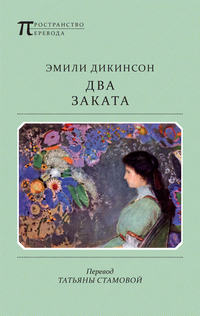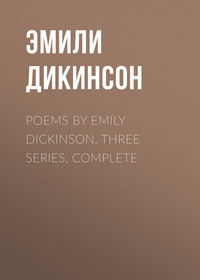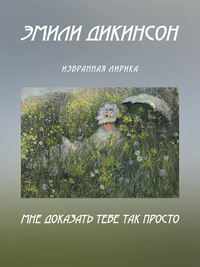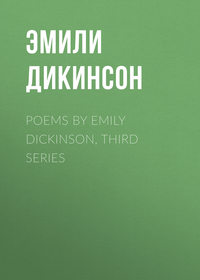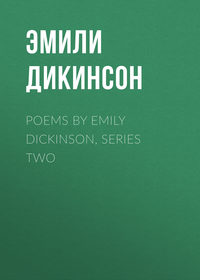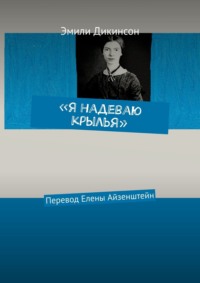Poems by Emily Dickinson, Series One
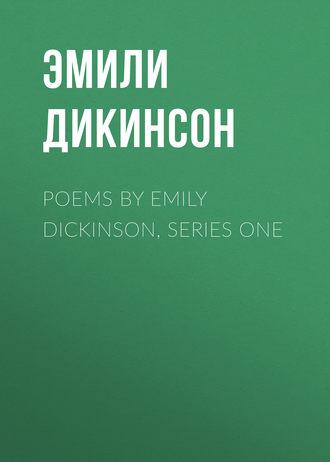 полная версия
полная версияPoems by Emily Dickinson, Series One
Жанр: зарубежная поэзиязарубежная классиказарубежная старинная литературастихи и поэзиялитература 19 векасерьезное чтениеcтихи, поэзия
Язык: Английский
Год издания: 2018
Добавлена:
Настройки чтения
Размер шрифта
Высота строк
Поля
VII
The bee is not afraid of me,I know the butterfly;The pretty people in the woodsReceive me cordially.The brooks laugh louder when I come,The breezes madder play.Wherefore, mine eyes, thy silver mists?Wherefore, O summer's day?VIII
SUMMER'S ARMIESSome rainbow coming from the fair!Some vision of the world CashmereI confidently see!Or else a peacock's purple train,Feather by feather, on the plainFritters itself away!The dreamy butterflies bestir,Lethargic pools resume the whirOf last year's sundered tune.From some old fortress on the sunBaronial bees march, one by one,In murmuring platoon!The robins stand as thick to-dayAs flakes of snow stood yesterday,On fence and roof and twig.The orchis binds her feather onFor her old lover, Don the Sun,Revisiting the bog!Without commander, countless, still,The regiment of wood and hillIn bright detachment stand.Behold! Whose multitudes are these?The children of whose turbaned seas,Or what Circassian land?IX
THE GRASSThe grass so little has to do, —A sphere of simple green,With only butterflies to brood,And bees to entertain,And stir all day to pretty tunesThe breezes fetch along,And hold the sunshine in its lapAnd bow to everything;And thread the dews all night, like pearls,And make itself so fine, —A duchess were too commonFor such a noticing.And even when it dies, to passIn odors so divine,As lowly spices gone to sleep,Or amulets of pine.And then to dwell in sovereign barns,And dream the days away, —The grass so little has to do,I wish I were the hay!X
A little road not made of man,Enabled of the eye,Accessible to thill of bee,Or cart of butterfly.If town it have, beyond itself,'T is that I cannot say;I only sigh, – no vehicleBears me along that way.XI
SUMMER SHOWERA drop fell on the apple tree,Another on the roof;A half a dozen kissed the eaves,And made the gables laugh.A few went out to help the brook,That went to help the sea.Myself conjectured, Were they pearls,What necklaces could be!The dust replaced in hoisted roads,The birds jocoser sung;The sunshine threw his hat away,The orchards spangles hung.The breezes brought dejected lutes,And bathed them in the glee;The East put out a single flag,And signed the fete away.XII
PSALM OF THE DAYA something in a summer's day,As sIow her flambeaux burn away,Which solemnizes me.A something in a summer's noon, —An azure depth, a wordless tune,Transcending ecstasy.And still within a summer's nightA something so transporting bright,I clap my hands to see;Then veil my too inspecting face,Lest such a subtle, shimmering graceFlutter too far for me.The wizard-fingers never rest,The purple brook within the breastStill chafes its narrow bed;Still rears the East her amber flag,Guides still the sun along the cragHis caravan of red,Like flowers that heard the tale of dews,But never deemed the dripping prizeAwaited their low brows;Or bees, that thought the summer's nameSome rumor of deliriumNo summer could for them;Or Arctic creature, dimly stirredBy tropic hint, – some travelled birdImported to the wood;Or wind's bright signal to the ear,Making that homely and severe,Contented, known, beforeThe heaven unexpected came,To lives that thought their worshippingA too presumptuous psalm.XIII
THE SEA OF SUNSETThis is the land the sunset washes,These are the banks of the Yellow Sea;Where it rose, or whither it rushes,These are the western mystery!Night after night her purple trafficStrews the landing with opal bales;Merchantmen poise upon horizons,Dip, and vanish with fairy sails.XIV
PURPLE CLOVERThere is a flower that bees prefer,And butterflies desire;To gain the purple democratThe humming-birds aspire.And whatsoever insect pass,A honey bears awayProportioned to his several dearthAnd her capacity.Her face is rounder than the moon,And ruddier than the gownOf orchis in the pasture,Or rhododendron worn.She doth not wait for June;Before the world is greenHer sturdy little countenanceAgainst the wind is seen,Contending with the grass,Near kinsman to herself,For privilege of sod and sun,Sweet litigants for life.And when the hills are full,And newer fashions blow,Doth not retract a single spiceFor pang of jealousy.Her public is the noon,Her providence the sun,Her progress by the bee proclaimedIn sovereign, swerveless tune.The bravest of the host,Surrendering the last,Nor even of defeat awareWhen cancelled by the frost.XV
THE BEELike trains of cars on tracks of plushI hear the level bee:A jar across the flowers goes,Their velvet masonryWithstands until the sweet assaultTheir chivalry consumes,While he, victorious, tilts awayTo vanquish other blooms.His feet are shod with gauze,His helmet is of gold;His breast, a single onyxWith chrysoprase, inlaid.His labor is a chant,His idleness a tune;Oh, for a bee's experienceOf clovers and of noon!XVI
Presentiment is that long shadow on the lawnIndicative that suns go down;The notice to the startled grassThat darkness is about to pass.XVII
As children bid the guest good-night,And then reluctant turn,My flowers raise their pretty lips,Then put their nightgowns on.As children caper when they wake,Merry that it is morn,My flowers from a hundred cribsWill peep, and prance again.XVIII
Angels in the early morningMay be seen the dews among,Stooping, plucking, smiling, flying:Do the buds to them belong?Angels when the sun is hottestMay be seen the sands among,Stooping, plucking, sighing, flying;Parched the flowers they bear along.XIX
So bashful when I spied her,So pretty, so ashamed!So hidden in her leaflets,Lest anybody find;So breathless till I passed her,So helpless when I turnedAnd bore her, struggling, blushing,Her simple haunts beyond!For whom I robbed the dingle,For whom betrayed the dell,Many will doubtless ask me,But I shall never tell!XX
TWO WORLDSIt makes no difference abroad,The seasons fit the same,The mornings blossom into noons,And split their pods of flame.Wild-flowers kindle in the woods,The brooks brag all the day;No blackbird bates his jargoningFor passing Calvary.Auto-da-fe and judgmentAre nothing to the bee;His separation from his roseTo him seems misery.XXI
THE MOUNTAINThe mountain sat upon the plainIn his eternal chair,His observation omnifold,His inquest everywhere.The seasons prayed around his knees,Like children round a sire:Grandfather of the days is he,Of dawn the ancestor.XXII
A DAYI'll tell you how the sun rose, —A ribbon at a time.The steeples swam in amethyst,The news like squirrels ran.The hills untied their bonnets,The bobolinks begun.Then I said softly to myself,"That must have been the sun!"* * *But how he set, I know not.There seemed a purple stileWhich little yellow boys and girlsWere climbing all the whileTill when they reached the other side,A dominie in grayPut gently up the evening bars,And led the flock away.XXIII
The butterfiy's assumption-gown,In chrysoprase apartments hung, This afternoon put on.How condescending to descend,And be of buttercups the friend In a New England town!XXIV
THE WINDOf all the sounds despatched abroad,There's not a charge to meLike that old measure in the boughs,That phraseless melodyThe wind does, working like a handWhose fingers brush the sky,Then quiver down, with tufts of tunePermitted gods and me.When winds go round and round in bands,And thrum upon the door,And birds take places overhead,To bear them orchestra,I crave him grace, of summer boughs,If such an outcast be,He never heard that fleshless chantRise solemn in the tree,As if some caravan of soundOn deserts, in the sky,Had broken rank,Then knit, and passedIn seamless company.XXV
DEATH AND LIFEApparently with no surpriseTo any happy flower,The frost beheads it at its playIn accidental power.The blond assassin passes on,The sun proceeds unmovedTo measure off another dayFor an approving God.XXVI
'T WAS later when the summer wentThan when the cricket came,And yet we knew that gentle clockMeant nought but going home.'T was sooner when the cricket wentThan when the winter came,Yet that pathetic pendulumKeeps esoteric time.XXVII
INDIAN SUMMERThese are the days when birds come back,A very few, a bird or two,To take a backward look.These are the days when skies put onThe old, old sophistries of June, —A blue and gold mistake.Oh, fraud that cannot cheat the bee,Almost thy plausibilityInduces my belief,Till ranks of seeds their witness bear,And softly through the altered airHurries a timid leaf!Oh, sacrament of summer days,Oh, last communion in the haze,Permit a child to join,Thy sacred emblems to partake,Thy consecrated bread to break,Taste thine immortal wine!XXVIII
AUTUMNThe morns are meeker than they were,The nuts are getting brown;The berry's cheek is plumper,The rose is out of town.The maple wears a gayer scarf,The field a scarlet gown.Lest I should be old-fashioned,I'll put a trinket on.XXIX
BECLOUDEDThe sky is low, the clouds are mean,A travelling flake of snowAcross a barn or through a rutDebates if it will go.A narrow wind complains all dayHow some one treated him;Nature, like us, is sometimes caughtWithout her diadem.XXX
THE HEMLOCKI think the hemlock likes to standUpon a marge of snow;It suits his own austerity,And satisfies an aweThat men must slake in wilderness,Or in the desert cloy, —An instinct for the hoar, the bald,Lapland's necessity.The hemlock's nature thrives on cold;The gnash of northern windsIs sweetest nutriment to him,His best Norwegian wines.To satin races he is nought;But children on the DonBeneath his tabernacles play,And Dnieper wrestlers run.XXXI
There's a certain slant of light,On winter afternoons,That oppresses, like the weightOf cathedral tunes.Heavenly hurt it gives us;We can find no scar,But internal differenceWhere the meanings are.None may teach it anything,' T is the seal, despair, —An imperial afflictionSent us of the air.When it comes, the landscape listens,Shadows hold their breath;When it goes, 't is like the distanceOn the look of death.IV.
TIME AND ETERNITY
I
One dignity delays for all,One mitred afternoon.None can avoid this purple,None evade this crown.Coach it insures, and footmen,Chamber and state and throng;Bells, also, in the village,As we ride grand along.What dignified attendants,What service when we pause!How loyally at partingTheir hundred hats they raise!How pomp surpassing ermine,When simple you and IPresent our meek escutcheon,And claim the rank to die!II
TOO LATEDelayed till she had ceased to know,Delayed till in its vest of snow Her loving bosom lay.An hour behind the fleeting breath,Later by just an hour than death, — Oh, lagging yesterday!Could she have guessed that it would be;Could but a crier of the glee Have climbed the distant hill;Had not the bliss so slow a pace, —Who knows but this surrendered face Were undefeated still?Oh, if there may departing beAny forgot by victory In her imperial round,Show them this meek apparelled thing,That could not stop to be a king, Doubtful if it be crowned!III
ASTRA CASTRADeparted to the judgment,A mighty afternoon;Great clouds like ushers leaning,Creation looking on.The flesh surrendered, cancelled,The bodiless begun;Two worlds, like audiences, disperseAnd leave the soul alone.IV
Safe in their alabaster chambers,Untouched by morning and untouched by noon,Sleep the meek members of the resurrection,Rafter of satin, and roof of stone.Light laughs the breeze in her castle of sunshine;Babbles the bee in a stolid ear;Pipe the sweet birds in ignorant cadence, —Ah, what sagacity perished here!Grand go the years in the crescent above them;Worlds scoop their arcs, and firmaments row,Diadems drop and Doges surrender,Soundless as dots on a disk of snow.V
On this long storm the rainbow rose,On this late morn the sun;The clouds, like listless elephants,Horizons straggled down.The birds rose smiling in their nests,The gales indeed were done;Alas! how heedless were the eyesOn whom the summer shone!The quiet nonchalance of deathNo daybreak can bestir;The slow archangel's syllablesMust awaken her.VI
FROM THE CHRYSALISMy cocoon tightens, colors tease,I'm feeling for the air;A dim capacity for wingsDegrades the dress I wear.A power of butterfly must beThe aptitude to fly,Meadows of majesty concedesAnd easy sweeps of sky.So I must baffle at the hintAnd cipher at the sign,And make much blunder, if at lastI take the clew divine.VII
SETTING SAILExultation is the goingOf an inland soul to sea, —Past the houses, past the headlands,Into deep eternity!Bred as we, among the mountains,Can the sailor understandThe divine intoxicationOf the first league out from land?VIII
Look back on time with kindly eyes,He doubtless did his best;How softly sinks his trembling sunIn human nature's west!IX
A train went through a burial gate,A bird broke forth and sang,And trilled, and quivered, and shook his throatTill all the churchyard rang;And then adjusted his little notes,And bowed and sang again.Doubtless, he thought it meet of himTo say good-by to men.X
I died for beauty, but was scarceAdjusted in the tomb,When one who died for truth was lainIn an adjoining room.He questioned softly why I failed?"For beauty," I replied."And I for truth, – the two are one;We brethren are," he said.And so, as kinsmen met a night,We talked between the rooms,Until the moss had reached our lips,And covered up our names.XI
"TROUBLED ABOUT MANY THINGS."How many times these low feet staggered,Only the soldered mouth can tell;Try! can you stir the awful rivet?Try! can you lift the hasps of steel?Stroke the cool forehead, hot so often,Lift, if you can, the listless hair;Handle the adamantine fingersNever a thimble more shall wear.Buzz the dull flies on the chamber window;Brave shines the sun through the freckled pane;Fearless the cobweb swings from the ceiling —Indolent housewife, in daisies lain!XII
REALI like a look of agony,Because I know it 's true;Men do not sham convulsion,Nor simulate a throe.The eyes glaze once, and that is death.Impossible to feignThe beads upon the foreheadBy homely anguish strung.XIII
THE FUNERALThat short, potential stirThat each can make but once,That bustle so illustrious'T is almost consequence,Is the eclat of death.Oh, thou unknown renownThat not a beggar would accept,Had he the power to spurn!XIV
I went to thank her,But she slept;Her bed a funnelled stone,With nosegays at the head and foot,That travellers had thrown,Who went to thank her;But she slept.'T was short to cross the seaTo look upon her like, alive,But turning back 't was slow.XV
I've seen a dying eyeRun round and round a roomIn search of something, as it seemed,Then cloudier become;And then, obscure with fog,And then be soldered down,Without disclosing what it be,'T were blessed to have seen.XVI
REFUGEThe clouds their backs together laid,The north begun to push,The forests galloped till they fell,The lightning skipped like mice;The thunder crumbled like a stuff —How good to be safe in tombs,Where nature's temper cannot reach,Nor vengeance ever comes!XVII
I never saw a moor,I never saw the sea;Yet know I how the heather looks,And what a wave must be.I never spoke with God,Nor visited in heaven;Yet certain am I of the spotAs if the chart were given.XVIII
PLAYMATESGod permits industrious angelsAfternoons to play.I met one, – forgot my school-mates,All, for him, straightway.God calls home the angels promptlyAt the setting sun;I missed mine. How dreary marbles,After playing Crown!XIX
To know just how he suffered would be dear;To know if any human eyes were nearTo whom he could intrust his wavering gaze,Until it settled firm on Paradise.To know if he was patient, part content,Was dying as he thought, or different;Was it a pleasant day to die,And did the sunshine face his way?What was his furthest mind, of home, or God,Or what the distant sayAt news that he ceased human natureOn such a day?And wishes, had he any?Just his sigh, accented,Had been legible to me.And was he confident untilIll fluttered out in everlasting well?And if he spoke, what name was best,What first,What one broke off withAt the drowsiest?Was he afraid, or tranquil?Might he knowHow conscious consciousness could grow,Till love that was, and love too blest to be,Meet – and the junction be Eternity?XX
The last night that she lived,It was a common night,Except the dying; this to usMade nature different.We noticed smallest things, —Things overlooked before,By this great light upon our mindsItalicized, as 't were.That others could existWhile she must finish quite,A jealousy for her aroseSo nearly infinite.We waited while she passed;It was a narrow time,Too jostled were our souls to speak,At length the notice came.She mentioned, and forgot;Then lightly as a reedBent to the water, shivered scarce,Consented, and was dead.And we, we placed the hair,And drew the head erect;And then an awful leisure was,Our faith to regulate.XXI
THE FIRST LESSONNot in this world to see his faceSounds long, until I read the placeWhere this is said to beBut just the primer to a lifeUnopened, rare, upon the shelf,Clasped yet to him and me.And yet, my primer suits me soI would not choose a book to knowThan that, be sweeter wise;Might some one else so learned be,And leave me just my A B C,Himself could have the skies.XXII
The bustle in a houseThe morning after deathIs solemnest of industriesEnacted upon earth, —The sweeping up the heart,And putting love awayWe shall not want to use againUntil eternity.XXIII
I reason, earth is short,And anguish absolute,And many hurt;But what of that?I reason, we could die:The best vitalityCannot excel decay;But what of that?I reason that in heavenSomehow, it will be even,Some new equation given;But what of that?XXIV
Afraid? Of whom am I afraid?Not death; for who is he?The porter of my father's lodgeAs much abasheth me.Of life? 'T were odd I fear a thingThat comprehendeth meIn one or more existencesAt Deity's decree.Of resurrection? Is the eastAfraid to trust the mornWith her fastidious forehead?As soon impeach my crown!XXV
DYINGThe sun kept setting, setting still;No hue of afternoonUpon the village I perceived, —From house to house 't was noon.The dusk kept dropping, dropping still;No dew upon the grass,But only on my forehead stopped,And wandered in my face.My feet kept drowsing, drowsing still,My fingers were awake;Yet why so little sound myselfUnto my seeming make?How well I knew the light before!I could not see it now.'T is dying, I am doing; butI'm not afraid to know.XXVI
Two swimmers wrestled on the sparUntil the morning sun,When one turned smiling to the land.O God, the other one!The stray ships passing spied a faceUpon the waters borne,With eyes in death still begging raised,And hands beseeching thrown.XXVII
THE CHARIOTBecause I could not stop for Death,He kindly stopped for me;The carriage held but just ourselvesAnd Immortality.We slowly drove, he knew no haste,And I had put awayMy labor, and my leisure too,For his civility.We passed the school where children played,Their lessons scarcely done;We passed the fields of gazing grain,We passed the setting sun.We paused before a house that seemedA swelling of the ground;The roof was scarcely visible,The cornice but a mound.Since then 't is centuries; but eachFeels shorter than the dayI first surmised the horses' headsWere toward eternity.XXVIII
She went as quiet as the dewFrom a familiar flower.Not like the dew did she returnAt the accustomed hour!She dropt as softly as a starFrom out my summer's eve;Less skilful than LeverrierIt's sorer to believe!XXIX
RESURGAMAt last to be identified!At last, the lamps upon thy side,The rest of life to see!Past midnight, past the morning star!Past sunrise! Ah! what leagues there areBetween our feet and day!XXX
Except to heaven, she is nought;Except for angels, lone;Except to some wide-wandering bee,A flower superfluous blown;Except for winds, provincial;Except by butterflies,Unnoticed as a single dewThat on the acre lies.The smallest housewife in the grass,Yet take her from the lawn,And somebody has lost the faceThat made existence home!XXXI
Death is a dialogue betweenThe spirit and the dust."Dissolve," says Death. The Spirit, "Sir,I have another trust."Death doubts it, argues from the ground.The Spirit turns away,Just laying off, for evidence,An overcoat of clay.XXXII
It was too late for man,But early yet for God;Creation impotent to help,But prayer remained our side.How excellent the heaven,When earth cannot be had;How hospitable, then, the faceOf our old neighbor, God!XXXIII
ALONG THE POTOMACWhen I was small, a woman died.To-day her only boyWent up from the Potomac,His face all victory,To look at her; how slowlyThe seasons must have turnedTill bullets clipt an angle,And he passed quickly round!If pride shall be in ParadiseI never can decide;Of their imperial conduct,No person testified.But proud in apparition,That woman and her boyPass back and forth before my brain,As ever in the sky.XXXIV
The daisy follows soft the sun,And when his golden walk is done, Sits shyly at his feet.He, waking, finds the flower near."Wherefore, marauder, art thou here?" "Because, sir, love is sweet!"We are the flower, Thou the sun!Forgive us, if as days decline, We nearer steal to Thee, —Enamoured of the parting west,The peace, the flight, the amethyst, Night's possibility!XXXV
EMANCIPATIONNo rack can torture me,My soul's at libertyBehind this mortal boneThere knits a bolder oneYou cannot prick with saw,Nor rend with scymitar.Two bodies therefore be;Bind one, and one will flee.The eagle of his nestNo easier divestAnd gain the sky,Than mayest thou,Except thyself may beThine enemy;Captivity is consciousness,So's liberty.XXXVI
LOSTI lost a world the other day.Has anybody found?You'll know it by the row of starsAround its forehead bound.A rich man might not notice it;Yet to my frugal eyeOf more esteem than ducats.Oh, find it, sir, for me!XXXVII
If I should n't be aliveWhen the robins come,Give the one in red cravatA memorial crumb.If I could n't thank you,Being just asleep,You will know I'm tryingWith my granite lip!XXXVIII
Sleep is supposed to be,By souls of sanity,The shutting of the eye.Sleep is the station grandDown which on either handThe hosts of witness stand!Morn is supposed to be,By people of degree,The breaking of the day.Morning has not occurred!That shall aurora beEast of eternity;One with the banner gay,One in the red array, —That is the break of day.XXXIX
I shall know why, when time is over,And I have ceased to wonder why;Christ will explain each separate anguishIn the fair schoolroom of the sky.He will tell me what Peter promised,And I, for wonder at his woe,I shall forget the drop of anguishThat scalds me now, that scalds me now.XL
I never lost as much but twice,And that was in the sod;Twice have I stood a beggarBefore the door of God!Angels, twice descending,Reimbursed my store.Burglar, banker, father,I am poor once more!

